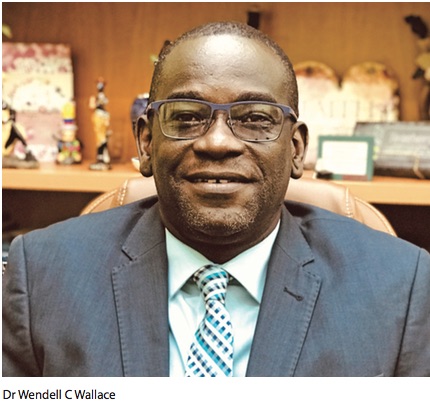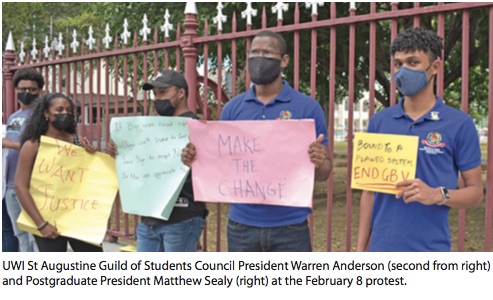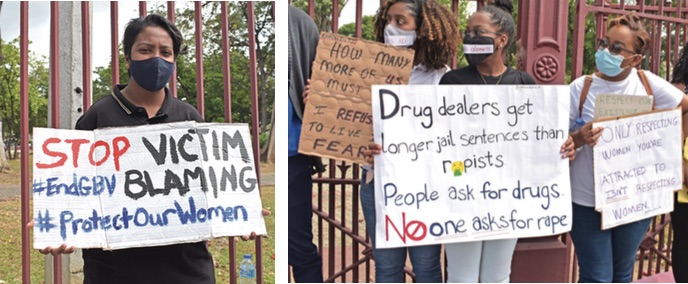UWI forms ‘Crime Group’ to find real solutions
Gender-based violence is only one aspect of lawlessness in a society that has struggled with crime over the last several decades. And though measures to curb crime have had some positive effects, criminality remains one of Trinidad and Tobago’s most persistent issues, hurting the economy, damaging T&T’s international reputation, and causing fear and anger among its people.

Recognising the urgency of this issue, UWI St Augustine has established a working group on crime to help the government – and the society itself – find answers.
“We want to identify the problems and find solutions,” says Dr Wendell C Wallace, Chair of the “Crime Group”.
Dr Wallace, a lecturer in the Criminology and Criminal Justice Unit of the Faculty of Social Sciences, says the group has several goals.
“We will conduct research as is needed, either individually or collectively as a working group, or in conjunction with the Government. We also aim to disseminate research findings widely. Another purpose is to provide assistance in developing intervention strategies.”
But most importantly, he stresses, their work is about solving problems, not just identifying them.
The Crime Group was born from a directive by UWI St Augustine Campus Principal Brian Copeland in a 2019 meeting of the campus’ Finance and General Purposes Committee. The group was to be campus-wide and multi-disciplinary.
The group consists of faculty members from the Criminology and Criminal Justice Unit, the Social Work Unit, the Department of Economics, the Department of Geomatics Engineering and Land Management, the Institute for Gender and Development Studies (IGDS), and a postgraduate student from the Department of Department of Behavioural Sciences. Most recently, a new member from the Faculty of Science and Technology has joined.
“We are broad-based, encompassing individuals from different faculties and disciplines,” says Dr Wallace.

The group is not the first UWI initiative to focus on crime. In 1996, the UWI Working Group in Caribbean Criminology delivered a “National Action Plan Against Crime” to the government. Likewise, there are several individual researchers and groups within the campus involved in research, policy and outreach. Dr Wallace himself focuses on policing, gangs, violence (domestic and school), and other related areas in his academic work. One of the main strengths of this new initiative is its inclusion of disciplines outside of the social sciences, which has traditionally been seen as the resource for scholarship on crime.
“We can look to fields like geomatics for example to bring their expertise in areas such as global positioning systems (GPS), a technology that is being used in anti-crime strategies,” says Dr Wallace.
Another feature of the Crime Group is its emphasis on student participation.
“We want more student members. It is important to have their perspective,” says Dr Wallace, who is also the Faculty of Social Sciences’ Deputy Dean for Marketing, Distance Education and Outreach. “We are going to include at least two more students. A great part of my work [as Deputy Dean] is getting students involved. We want to hear their voices, as well as their representative body, the Guild of Students.”
The Crime Group is still in its formative stages. Dr Wallace says progress has been slow because of COVID-19 and its impact on teaching and work in general. However, there has been some progress over 2020 into today.
“Thus far we have collected a host of data from the Crime and Problem Analysis Branch (CAPA) of the Trinidad and Tobago Police Service (TTPS), which is being analysed for trends,” says Dr Wallace.
The plan, he says, is to focus on the two most prevalent areas of crime. This, however, does not prevent members of the team from conducting research in their own areas of specialisation. The Crime Group is also collecting existing research from within the campus. Dr Wallace says the intention “is to disseminate research that has been published” to agencies such as the Ministry of National Security, the Ministry of Social Development and Family Services, the TTPS and others.
“In quite a few instances, research has been published by academics at UWI and sometimes you only find it if you are conducting research in that area. We have a good bit of research emanating from the university that remains untapped and even unknown,” he explains.
Teams like the UWI St Augustine Police Research Group (UWISA-PRG) and the Research Group on Domestic Violence are already doing great work in crime-related areas. The latter in particular is researching aspects of gender-based violence specifically through intimate partner homicide (IPH) and men as victims of domestic violence, an area that has been given little research attention in T&T, Dr Wallace says.

“We as academics need to understand that domestic violence is not a gender issue. It is a people issue. Men are also victims of abuse in intimate relationships and we need to fix all sides,” he explains.
Presently, the Crime Group is focusing on finding at least two areas of concentrated criminality and developing solutions and interventions for these areas to provide to the government. They also plan on working directly with communities in T&T.
“We intend to put more focus on outreach,” says Dr Wallace. “We want to make sure that the research meets its intended targets. This will include community programmes, lectures, informal ‘sit and chats’, etc, anything to reach the communities in a tangible way. It could be something as simple as helping them to interact better with the police or teaching safety procedures when leaving and entering their homes.”
However, lasting change will require more than just the work of UWI or even the government, Dr Wallace says. It requires change from the society itself.
“Every citizen has a vested interest in T&T, and we have a responsibility to ensure that crime is managed,” he says. “Quite often, parenting is lacking. I want to ask that we start policing from the home. I tell people that the first police officer I knew was my mother. She would check my school bags. If I came home with something that didn’t belong to me, I had to carry it back.”
He adds, “Let us start from our churches, our mosques, our temples. Let us start at the schools. There is a role for the community. We need the community. We need to take back what has been lost.”